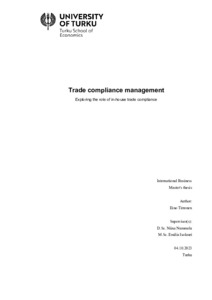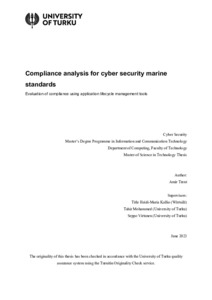Trade compliance management: exploring the role of in-house trade compliance
Tirronen, Eino (2023-10-09)
Trade compliance management: exploring the role of in-house trade compliance
Tirronen, Eino
(09.10.2023)
Julkaisu on tekijänoikeussäännösten alainen. Teosta voi lukea ja tulostaa henkilökohtaista käyttöä varten. Käyttö kaupallisiin tarkoituksiin on kielletty.
avoin
Julkaisun pysyvä osoite on:
https://urn.fi/URN:NBN:fi-fe20231011139660
https://urn.fi/URN:NBN:fi-fe20231011139660
Tiivistelmä
The study aims to explore the role of in-house trade compliance and how it operates in
multinational companies. As such, the study's main research question is “What is the role of in-
house trade compliance in multinational companies?”.
Trade compliance oversees that business activities comply with regulatory requirements. In
addition, trade compliance activities include optimization of supply chains. The in-house teams
are involved in activities such as tariff classification, incoterms consultation, preferential
treatment activities, license management, export controls, customs management, screening, and
valuation. However, academic research on this topic remains relatively limited despite the
acknowledged importance of trade compliance to efficient trading operations and global supply
chains. Therefore, this study aims to address this research gap and provide insights into the role
of in-house trade compliance.
Based on the study results, in-house trade compliance is both operational and advisory, and
companies often emphasize the role of automation and outsourcing in their trade compliance
functions. Automation ensures that human error is limited and errors are noticed proactively.
Outsourcing releases resourced for more consulting work. However, compliance responsibility
remains with the company, and the management level should be in-house. As such, it is common
for in-house teams to perform audits and spot checks on reported documentation. A common
approach to in-house trade compliance is to have a global team overseeing global guidelines and
area-specific teams or managers to support and implement compliance in other departments.
However, the approach to in-house trade compliance may vary across different companies and
industries, and each company may have its unique perspective on trade compliance. Therefore, it
is important for companies to carefully consider their specific trade compliance requirements and
tailor their approach accordingly.
multinational companies. As such, the study's main research question is “What is the role of in-
house trade compliance in multinational companies?”.
Trade compliance oversees that business activities comply with regulatory requirements. In
addition, trade compliance activities include optimization of supply chains. The in-house teams
are involved in activities such as tariff classification, incoterms consultation, preferential
treatment activities, license management, export controls, customs management, screening, and
valuation. However, academic research on this topic remains relatively limited despite the
acknowledged importance of trade compliance to efficient trading operations and global supply
chains. Therefore, this study aims to address this research gap and provide insights into the role
of in-house trade compliance.
Based on the study results, in-house trade compliance is both operational and advisory, and
companies often emphasize the role of automation and outsourcing in their trade compliance
functions. Automation ensures that human error is limited and errors are noticed proactively.
Outsourcing releases resourced for more consulting work. However, compliance responsibility
remains with the company, and the management level should be in-house. As such, it is common
for in-house teams to perform audits and spot checks on reported documentation. A common
approach to in-house trade compliance is to have a global team overseeing global guidelines and
area-specific teams or managers to support and implement compliance in other departments.
However, the approach to in-house trade compliance may vary across different companies and
industries, and each company may have its unique perspective on trade compliance. Therefore, it
is important for companies to carefully consider their specific trade compliance requirements and
tailor their approach accordingly.
Samankaltainen aineisto
Näytetään aineisto, joilla on samankaltaisia nimekkeitä, tekijöitä tai asiasanoja.
-
Compliance analysis for cyber security marine standards : Evaluation of compliance using application lifecycle management tools
Trent, Amir (25.07.2023)The aim of this thesis is to analyse cyber security requirements and notations from marine classification societies and other entities to understand how to meet compliance in current cyber security requirements from maritime ...avoin -
Applying Information-Motivation-Behavioral Skills Model to Improve Information Security Policy Compliance among Employees
Välimäki, Tommi (07.06.2019)Information security policy (ISP) compliance of employees is a big concern for companies because the employees themselves present a major IS threat. Companies mitigate this concern by improving the ISP compliant behavior ...suljettu -
Indicators in Improving Corporate Compliance on Human Rights : Indicators in Human Rights Governance and the EU Directive on Non-Financial Information
Kahiluoto, Joanna (Turun yliopisto, 27.06.2018)The increasing use of indicators in global governance facilitates transforming complex phenomenon into simple and easily comparable numbers. There are, however, certain implications in employing indicators into international ...

